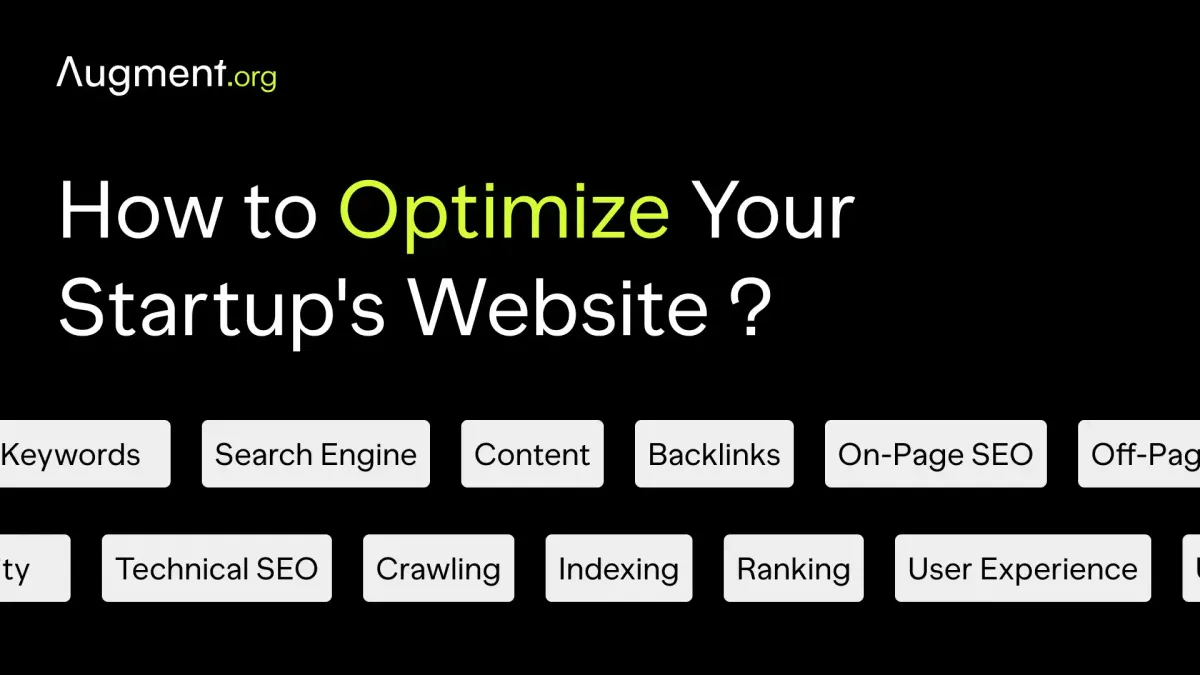SEO for Startups: How to Optimize Your Startup's Website
SEO is essential for standing out in the digital marketplace. With an effective SEO strategy, a startup can significantly boost its visibility in search engine results. Learn how keyword research, content marketing, and smart SEO practices can transform your online presence.

What is SEO?
SEO, or Search Engine Optimization, is the strategic process of enhancing a website to improve its visibility when people search for products or services related to a business in search engines like Google. It's about understanding what people are searching for online, the answers they are seeking, the words they're using, and the type of content they wish to consume. By aligning a website's content with these search queries, SEO helps increase organic traffic — visitors coming directly from search engines.
This process involves various techniques, from tweaking the website's technical setup to ensuring that the content is valuable and relevant. It's not just about including specific keywords; it's about creating a user experience that is both informative and easy to navigate. Effective SEO strategies ensure that a startup's website is discoverable, engaging, and, most importantly, ranks well on search engine results pages, bringing more potential customers to the site.
For startups, SEO is a crucial component of digital marketing efforts, offering a way to gain visibility without the high costs of paid advertising. By focusing on optimizing their online presence, startups can compete with larger players in the digital arena and capture the attention of their target audience more effectively.
Why is SEO Important for Startups?
SEO is a game-changer for startups, offering a platform to stand out from the competition. Here's why it's so important:
- Cost-Effective Visibility: Unlike paid advertising that requires continuous funding, SEO provides a more sustainable and cost-effective way to gain visibility. Once a startup ranks higher in search results, it enjoys ongoing organic traffic without the recurring expense.
- Builds Credibility and Trust: A startup appearing on the first page of search results is often viewed as more credible and trustworthy by potential customers. Good SEO practices help build a startup's reputation over time.
- Targets Relevant Audience: Through keyword research and understanding search intent, SEO allows startups to attract visitors who are actively searching for solutions that the startup offers. This targeted approach increases the chances of conversions.
- Long-Term Results: SEO efforts, although taking time to show results, offer long-term benefits. A well-optimized website continues to drive traffic and growth over time, unlike short-lived advertising campaigns.
- Better User Experience: Part of SEO involves optimizing the website for a better user experience. This not only improves search rankings but also enhances customer satisfaction, leading to higher engagement and retention rates.
- Competitive Advantage: In the competitive startup ecosystem, having a robust SEO strategy can set a business apart from its competitors. It helps a startup to capitalize on specific keywords and market gaps that larger companies might overlook.
- Data-Driven Insights: Tools like Google Analytics and Google Search Console provide valuable insights into customer behavior, preferences, and trends. These insights can inform not just SEO strategies but broader business decisions.
For startups looking to carve out their niche and build a sustainable online presence, investing in SEO is not just beneficial; it's essential. It's about laying a foundation for continuous growth, improved customer reach, and a stronger brand presence in the digital world.
6 Steps for Identifying Your SEO Objectives
Here are key considerations for startups to set their SEO objectives:
- Increase Website Traffic: A primary goal for many startups is to boost the number of visitors to their website. This involves targeting specific keywords that are relevant to their business and audience.
- Improve Search Rankings: Climbing higher in search engine results pages (SERPs) for targeted keywords is a common objective. This not only increases visibility but also positions the startup as a credible player in its field.
- Enhance User Engagement: Beyond just attracting visitors, startups should aim to engage users on their website. This means creating high-quality, relevant content that resonates with their audience.
- Generate Leads and Sales: An effective SEO strategy should ultimately contribute to the bottom line by generating leads and sales. This involves optimizing web pages for conversion – turning visitors into customers.
- Build Brand Awareness and Authority: For startups, SEO can be instrumental in building brand awareness and establishing authority in their niche. This includes consistently appearing in search results for industry-related queries.
- Optimize for Local Search: For startups focusing on local markets, appearing in local search results and Google Business Profile listings is crucial. This involves optimizing for location-based keywords and local SEO practices.
By setting specific, measurable, and achievable SEO goals, startups can more effectively align their digital marketing efforts with their overall business objectives. This not only streamlines their SEO tasks but also provides a clear framework for measuring the success of their SEO strategy.
Keyword Research: Finding the Right Words for Your Audience
Keyword research is the process of identifying and analyzing the terms and phrases that people enter into search engines. This foundational step in SEO involves understanding the specific words and language your target audience uses when they search for products, services, or information related to your business. It's about getting into the minds of potential customers and uncovering the actual search terms they use.
This practice is more than just guessing popular search terms; it involves methodically discovering and analyzing the various keywords that are relevant to your startup. The goal is to pinpoint terms that not only align with your business offerings but also have a significant monthly search volume, indicating a high interest among users. Through keyword research, startups gain insights into market demands, user behavior, and the competitive landscape.
Effective keyword research helps in crafting a targeted SEO strategy. By understanding the most sought-after keywords in your niche, you can tailor your website and content to align with these terms. This alignment not only improves your visibility in search engine results but also ensures that the traffic you attract is more likely to be interested in what your startup offers.
The process involves several steps:
- Identifying Initial Keyword Ideas: Start by brainstorming potential keywords that relate to your products or services.
- Expanding Your Keyword List: Use keyword research tools to expand this list, finding related terms and phrases that you might not have considered.
- Analyzing Keyword Data: Evaluate the keywords for factors like search volume, competition level, and relevance to your business.
- Understanding User Intent: Determine what users are likely looking for when they search for these keywords - information, purchase options, service inquiries, etc.
9 Website Optimization Techniques for Startups
Creating a solid SEO foundation is crucial for any startup looking to improve its online visibility. This involves a series of on-page optimization techniques that enhance the website's compatibility with search engines and user experience. Here are key techniques to consider:
- Optimize Title Tags and Meta Descriptions: Ensure each page has a unique and descriptive title tag and meta description. These elements should include relevant keywords and provide a clear idea of the page's content.
- Use Header Tags Effectively: Organize content using header tags (H1, H2, H3, etc.). This helps search engines understand the structure of your content and its relevance to search queries.
- Improve Page Speed: Fast-loading pages are favored by search engines and users alike. Use tools like Google PageSpeed Insights to identify and fix factors slowing down your site.
- Ensure Mobile Responsiveness: With the increasing use of mobile devices for internet access, having a mobile-friendly website is essential for both SEO and user experience.
- Implement Internal Linking: Use internal links to connect various pages within your website. This not only helps with website navigation but also spreads link equity across different pages.
- Optimize Your Content: Create high-quality, relevant content that targets your audience's search intent. Use keywords naturally and avoid keyword stuffing.
- Use Alt Text for Images: Ensure all images have descriptive alt text. This improves web accessibility and helps search engines understand the content of the images.
- Leverage Technical SEO: Address technical aspects like a clean URL structure, proper use of canonical tags, and creating an XML sitemap. Tools like Google Search Console can be instrumental in identifying and resolving technical SEO issues.
- Focus on Core Web Vitals: Google's Core Web Vitals are key metrics that measure the health and usability of a page. Optimizing for these factors can significantly boost your search engine rankings.
Off-Page SEO for Startups
Off-page SEO is crucial for startups seeking to enhance their digital presence beyond their website. It involves strategies implemented outside of the website to improve its position in search engine rankings. Here are key off-page SEO tactics for startups:
- Link Building: Acquiring high-quality backlinks from reputable websites is a core element of off-page SEO. Backlinks act as endorsements, signaling to search engines that others vouch for your content.
- Social Media Marketing: Active social media engagement can drive traffic to your website and increase brand awareness. While social media signals don't directly influence rankings, they contribute to wider visibility and indirect traffic.
- Influencer Collaborations: Partnering with influencers in your industry can amplify your content's reach and generate quality backlinks. Influencers can introduce your brand to a broader audience, enhancing your online reputation.
- Content Marketing: Creating valuable and shareable content is key to earning backlinks and engagement from external sources. This could include blog posts, infographics, or videos that offer value and are likely to be shared.
- Guest Blogging: Writing articles for other websites in your industry can expose your brand to a wider audience and earn backlinks. It's essential to focus on relevant, high-authority sites.
- Local SEO: For startups targeting local customers, local SEO is vital. This includes optimizing for local search terms, getting listed in local directories, and ensuring your Google Business Profile is up-to-date.
- Online Reputation Management: Monitoring and managing your brand's reputation online is part of effective off-page SEO. This can include addressing customer feedback and ensuring positive reviews on various platforms.
- Forum Engagement: Participating in industry forums or Q&A sites like Quora can help establish your startup as a thought leader, driving traffic to your site and potentially earning backlinks.
How to Create an SEO Content Strategy
An SEO content strategy is vital for startups looking to enhance their online presence and drive organic traffic. This strategy revolves around creating and distributing content that resonates with your audience and aligns with search engine optimization principles. Here's how to develop an effective SEO content strategy:
- Identify Your Target Audience: Understand who your audience is, what they need, and what they are searching for. This knowledge shapes the type of content you create.
- Conduct Keyword Research: Use keyword research tools to identify target keywords relevant to your audience's search queries. Focus on keywords with a good balance of search volume and competition.
- Analyze Search Intent: Determine what your audience intends to find with their searches. Create content that answers their questions, solves their problems, or provides the information they seek.
- Plan Your Content Types: Depending on your audience and goals, decide on the types of content you will create. This could include blog posts, how-to guides, videos, infographics, or podcasts.
- Create High-Quality, Relevant Content: Produce content that is engaging, informative, and valuable to your audience. Ensure it's well-written, fact-checked, and aligns with your brand's voice.
- Optimize for SEO: Incorporate target keywords naturally, use internal links, optimize title tags and meta descriptions, and ensure your content is mobile-friendly and loads quickly.
- Regularly Update Your Content: Search engines favor fresh, updated content. Regularly review and update your existing content to keep it relevant and effective.
- Promote Your Content: Share your content across various channels like social media, email newsletters, and influencer collaborations to increase its reach and visibility.
- Track and Analyze Performance: Use tools like Google Analytics to monitor how your content performs. Look at metrics like traffic, engagement, and conversion rates to understand what works and what needs improvement.
Leveraging SEO Tools and Resources Effectively
For startups, efficiently utilizing SEO tools and resources is key to developing a successful SEO strategy. These tools offer valuable insights, aid in optimizing your website, and help track your SEO performance. Here's how to make the most of these tools:
- Google Search Console: This free tool from Google is essential for monitoring your website's presence in Google search results. It helps identify issues, understand your search traffic, and optimize your ranking.
- Keyword Research Tools: Tools like Google Keyword Planner or other keyword research tools are invaluable for finding relevant keywords and phrases. They provide data on search volume, competition, and even suggest related keywords.
- SEO Analytics Tools: Platforms like Google Analytics offer a wealth of data about your website’s traffic, user behavior, and conversion metrics. Understanding this data is crucial for refining your SEO strategy.
- Technical SEO Tools: Utilize technical SEO tools like Semrush or Ahrefs to analyze and improve website infrastructure elements like site speed, mobile usability, and crawl errors.
- Content Optimization Tools: Tools like Surfer or Clearscope are crucial in optimizing content for SEO. They assist with keyword density, readability, and ensuring your content is SEO-friendly.
- Link Building Tools: For off-page SEO, link-building tools can help identify link-building opportunities and track the backlink profile of your website.
- Local SEO Tools: If your startup targets local customers, tools that specialize in local SEO, like Google My Business, are crucial for managing your local online presence.
Common SEO Pitfalls for Startups
Navigating the world of SEO for startups can be challenging, with several common pitfalls potentially undermining their efforts. A frequent misstep involves overlooking technical SEO aspects such as website loading speed, mobile responsiveness, and site structure. These elements are crucial for both user experience and search engine rankings, and neglecting them can lead to poor SEO performance.
Inadequate keyword research is another common issue. Startups often target either highly competitive broad keywords or overly niche keywords with minimal search volume. Effective keyword research should focus on finding a balance, targeting relevant keywords with a reasonable search volume and manageable competition. Moreover, aligning content with the search intent behind these keywords is essential. It's not enough to merely include keywords; the content should address the users' queries and provide substantial value.
Content quality is a critical factor often overlooked in the rush to optimize for search engines. High-quality, engaging content is vital for retaining user interest and encouraging longer website visits, which in turn positively impacts SEO. However, some startups focus excessively on keyword inclusion, leading to content that feels unnatural or forced. This practice not only detracts from the user experience but can also harm the website's SEO in the long run.
Another pitfall is ignoring the importance of link building. Quality backlinks from reputable websites significantly boost SEO, but acquiring them requires a strategic approach. Startups should aim for organic link-building strategies, such as creating shareable content or guest blogging on respected platforms, rather than resorting to quick-fix methods.
Startups also often neglect the power of analytics in guiding their SEO strategies. Tools like Google Analytics and Google Search Console offer invaluable insights into website performance, user behavior, and SEO efficacy. Regularly analyzing this data helps startups refine their SEO tactics, ensuring they are aligned with their business goals and audience needs.
Avoiding these common pitfalls can dramatically enhance a startup's SEO efforts, leading to better search engine visibility, increased organic traffic, and ultimately, greater business success.



